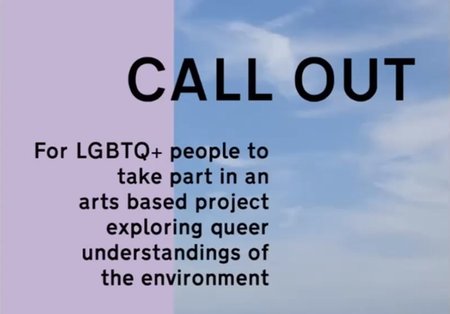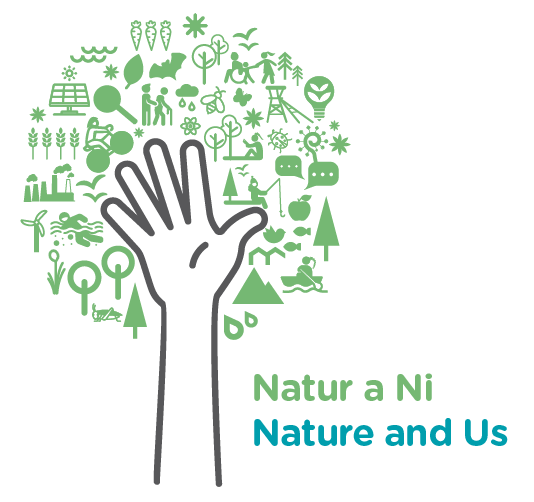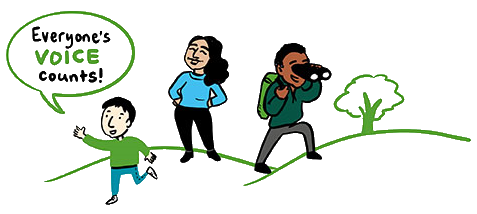Cerian Wilshere-Davies

Cerian Wilshere-Davies is a comedian, theatre maker and facilitator based in Swansea. Their work focuses queer Welsh history and forging connections between LGBTQ+ people living Wales and Welsh landscape, heritage and community. Cerian is the founder of Queer Clown Cabaret and is passionate about platforming and celebrating queer voices. Their residency was an investigation into queer ecology and looking at how the queer experience can shape our understanding of the environment and community around us.
They chose the Swansea and Gower Coast as their hyper local residency as they had built a strong relationship with over lockdown. They wanted to explore their queer identity and their connection to Wales and how they are intertwined. Part of the investigation was to try and understand if these connections exist in the wider LGBTQ+ community, why those connections exist and how we could build stronger connections in future.
They carried out site visits and reflective walking activities – considering questions about the relationship between non-binary identity and the coast is liminal space between land and sea.
They sent out an open call for people from the LGBTQ+ community asking for people to participate in an informal interview exploring their relationship with the Welsh coast.
They ran a creative workshop on Swansea beach for LGBTQ+ people to carry out creative activities and explore queer ecology and their connection to landscape. There were nine people attended. Half of the participants were from Swansea and the other had travelled from Cardiff or West Wales.
What they learnt
Many of the people that Cerian interviews were from coastal areas of ales or rural communities. Most felt very conflicting emotions about rural spaces. On one hand they felt that the rural communities that they grew up in was very isolating and abrasive for queer people, on the other hand they felt the natural landscape offer a non-judgmental space where they could connect with nature and their personal identity. Interviewees reported a feeling that isolation in rural communities caused a lot of young people to leave Wales to urban areas where they can feel more accepted and be part of a queer community. This then leads to less representation for queer people in rural communities which makes the situation even worse.
There is a small influx of queer people moving back to Wales. This is a good time for creating more representation but requires support as formative LGBTQ+ role models are important in helping young LGBTQ+ people cement a relationship between nature, Wales and their own identity.
Access to the natural environment was raised as a key issue in many interviews. Physical issues such as travel were reported but also perceptual barriers like not feeling welcome in some public spaces. The coast was seen as a vital commodity in this sense as it offers a space that was not seen to be owned by anyone. This is illustrated by one response from the interviews: “For me, it’s become this area where I feel like it’s a no man’s land. No one can really question you. Its all about the joy of public space, but also with the privacy of the natural geography and things like that. You’re not going to a National Park of anything like that. You’re just going to the beach. No one can stop anyone from going to the beach.”
Cerian highlighted the queer ecology theory that LGBTQ+ people can be left out of environmentalism due to the misconception that they are less likely to have children and therefore less think to the future. This thinking can also lead to misconceptions that queer people are self-centred and hedonistic and therefore less likely to think to the future. Many queer people show a great deal of care for the natural environments, and it is translatable to the care given within the queer community to it members. However, there is a lot of hostile and negative sentiment targeted at queer people in the mainstream media, centred around issues of gender identity. This is making it harder for LGBTQ+ people to want to open up and share their experiences and there is a risk that those voices will go unheard in public planning.
What we can learn from this
Queer ecology can offer a way to reimagine ourselves as part of nature rather than trying to dominate it. This means being more open to the perspective of all living things and not automatically ‘othering’ what fits into our view of the normal hierarchy of life e.g. humans are the dominant force in the world and all other things are subservient to them. Further analysis may offer a way to better understand our connection with nature and how we might help people feel responsible for its future.
On a more specific point of learning, this project has taught us that just because you have a right of access don’t mean that you feel welcome. This is an important consideration in the provision of public access as it is assumed that anyone can ‘exercise their rights’, which is true, but if a community is marginalised this can feel more like the requirement to take rather than the gift of giving. In this study, the coast is seen as a ‘liminal’ space that is non-judgmental and accepting. This is different from other form of public access or recreation areas that can feel very judgmental towards LGBTQ+ communities. We need to understand more about what creates these barriers for marginalised communities and how we can shift the perception of public access from a right to be taken to a gift to be given.

